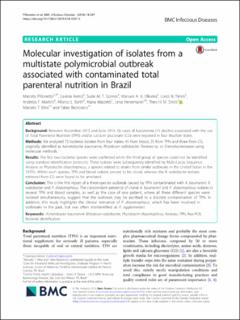Please use this identifier to cite or link to this item:
https://doi.org/10.21256/zhaw-4685Full metadata record
| DC Field | Value | Language |
|---|---|---|
| dc.contributor.author | Pillonetto, Marcelo | - |
| dc.contributor.author | Arend, Lavinia | - |
| dc.contributor.author | Gomes, Suzie M. T. | - |
| dc.contributor.author | Oliveira, Marluce A. A. | - |
| dc.contributor.author | Timm, Loeci N. | - |
| dc.contributor.author | Martins, Andreza F. | - |
| dc.contributor.author | Barth, Afonso L. | - |
| dc.contributor.author | Mazzetti, Alana | - |
| dc.contributor.author | Hersemann, Lena | - |
| dc.contributor.author | Smits, Theo H. M. | - |
| dc.contributor.author | Mira, Marcelo T. | - |
| dc.contributor.author | Rezzonico, Fabio | - |
| dc.date.accessioned | 2018-08-17T09:22:29Z | - |
| dc.date.available | 2018-08-17T09:22:29Z | - |
| dc.date.issued | 2018-08-13 | - |
| dc.identifier.issn | 1471-2334 | de_CH |
| dc.identifier.uri | https://digitalcollection.zhaw.ch/handle/11475/9133 | - |
| dc.description.abstract | Background: Between November 2013 and June 2014, 56 cases of bacteremia (15 deaths) associated with the use of Total Parenteral Nutrition (TPN) and/or calcium gluconate (CG) were reported in four Brazilian states. Methods: We analyzed 73 bacterial isolates from four states: 45 from blood, 25 from TPN and three from CG, originally identified as Acinetobacter baumannii, Rhizobium radiobacter, Pantoea sp. or Enterobacteriaceae using molecular methods. Results: The first two bacterial species were confirmed while the third group of species could not be identified using standard identification protocols. These isolates were subsequently identified by Multi-Locus Sequence Analysis as Phytobacter diazotrophicus, a species related to strains from similar outbreaks in the United States in the 1970’s. Within each species, TPN and blood isolates proved to be clonal, whereas the R. radiobacter isolates retrieved from CG were found to be unrelated. Conclusion: This is the first report of a three-species outbreak caused by TPN contaminated with A. baumannii, R. radiobacter and P. diazotrophicus. The concomitant presence of clonal A. baumannii and P. diazotrophicus isolates in several TPN and blood samples, as well as the case of one patient, where all three different species were isolated simultaneously, suggest that the outbreak may be ascribed to a discrete contamination of TPN. In addition, this study highlights the clinical relevance of P. diazotrophicus, which has been involved in outbreaks in the past, but was often misidentified as P. agglomerans. | de_CH |
| dc.language.iso | en | de_CH |
| dc.publisher | BioMed Central | de_CH |
| dc.relation.ispartof | BMC Infectious Diseases | de_CH |
| dc.rights | https://creativecommons.org/licenses/by/4.0/ | de_CH |
| dc.subject | Acinetobacter baumannii | de_CH |
| dc.subject | Rhizobium radiobacter | de_CH |
| dc.subject | Rep-PCR | de_CH |
| dc.subject | Bacterial identification | de_CH |
| dc.subject | Phytobacter diazotrophicus | de_CH |
| dc.subject | Pantoea | de_CH |
| dc.subject | TPN | de_CH |
| dc.subject.ddc | 570: Biologie | de_CH |
| dc.subject.ddc | 616: Innere Medizin und Krankheiten | de_CH |
| dc.title | Molecular investigation of isolates from a multistate polymicrobial outbreak associated with contaminated total parenteral nutrition in Brazil | de_CH |
| dc.type | Beitrag in wissenschaftlicher Zeitschrift | de_CH |
| dcterms.type | Text | de_CH |
| zhaw.departement | Life Sciences und Facility Management | de_CH |
| zhaw.organisationalunit | Institut für Umwelt und Natürliche Ressourcen (IUNR) | de_CH |
| dc.identifier.doi | 10.21256/zhaw-4685 | - |
| dc.identifier.doi | 10.1186/s12879-018-3287-2 | de_CH |
| zhaw.funding.eu | No | de_CH |
| zhaw.issue | 397 | de_CH |
| zhaw.originated.zhaw | Yes | de_CH |
| zhaw.pages.end | 11 | de_CH |
| zhaw.pages.start | 1 | de_CH |
| zhaw.publication.status | publishedVersion | de_CH |
| zhaw.volume | 18 | de_CH |
| zhaw.publication.review | Peer review (Publikation) | de_CH |
| zhaw.webfeed | Umweltgenomik | de_CH |
| zhaw.funding.zhaw | Sepsis-Associated Microorganisms in Brazilian Ambulatories (SAMBA) | de_CH |
| Appears in collections: | Publikationen Life Sciences und Facility Management | |
Files in This Item:
| File | Description | Size | Format | |
|---|---|---|---|---|
| Phytobacter outbreak (Pillonetto BMC2018).pdf | 1.89 MB | Adobe PDF |  View/Open |
Show simple item record
Pillonetto, M., Arend, L., Gomes, S. M. T., Oliveira, M. A. A., Timm, L. N., Martins, A. F., Barth, A. L., Mazzetti, A., Hersemann, L., Smits, T. H. M., Mira, M. T., & Rezzonico, F. (2018). Molecular investigation of isolates from a multistate polymicrobial outbreak associated with contaminated total parenteral nutrition in Brazil. BMC Infectious Diseases, 18(397), 1–11. https://doi.org/10.21256/zhaw-4685
Pillonetto, M. et al. (2018) ‘Molecular investigation of isolates from a multistate polymicrobial outbreak associated with contaminated total parenteral nutrition in Brazil’, BMC Infectious Diseases, 18(397), pp. 1–11. Available at: https://doi.org/10.21256/zhaw-4685.
M. Pillonetto et al., “Molecular investigation of isolates from a multistate polymicrobial outbreak associated with contaminated total parenteral nutrition in Brazil,” BMC Infectious Diseases, vol. 18, no. 397, pp. 1–11, Aug. 2018, doi: 10.21256/zhaw-4685.
PILLONETTO, Marcelo, Lavinia AREND, Suzie M. T. GOMES, Marluce A. A. OLIVEIRA, Loeci N. TIMM, Andreza F. MARTINS, Afonso L. BARTH, Alana MAZZETTI, Lena HERSEMANN, Theo H. M. SMITS, Marcelo T. MIRA und Fabio REZZONICO, 2018. Molecular investigation of isolates from a multistate polymicrobial outbreak associated with contaminated total parenteral nutrition in Brazil. BMC Infectious Diseases. 13 August 2018. Bd. 18, Nr. 397, S. 1–11. DOI 10.21256/zhaw-4685
Pillonetto, Marcelo, Lavinia Arend, Suzie M. T. Gomes, Marluce A. A. Oliveira, Loeci N. Timm, Andreza F. Martins, Afonso L. Barth, et al. 2018. “Molecular Investigation of Isolates from a Multistate Polymicrobial Outbreak Associated with Contaminated Total Parenteral Nutrition in Brazil.” BMC Infectious Diseases 18 (397): 1–11. https://doi.org/10.21256/zhaw-4685.
Pillonetto, Marcelo, et al. “Molecular Investigation of Isolates from a Multistate Polymicrobial Outbreak Associated with Contaminated Total Parenteral Nutrition in Brazil.” BMC Infectious Diseases, vol. 18, no. 397, Aug. 2018, pp. 1–11, https://doi.org/10.21256/zhaw-4685.
Items in DSpace are protected by copyright, with all rights reserved, unless otherwise indicated.